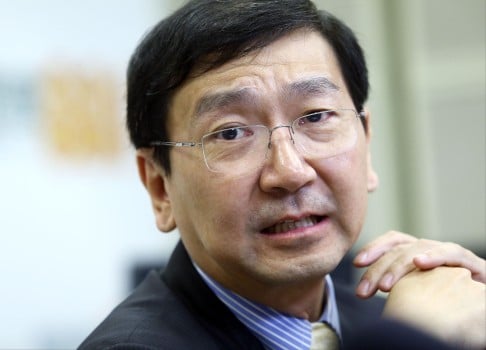JEFFIE LAM
JEFFIE.LAM@SCMP.COM
PUBLISHED : Wednesday, 30 September, 2015, 7:09pm
UPDATED : Wednesday, 30 September, 2015, 7:12pm
Yash Ghai (left) and Cheryl Saunders back Johannes Chan. Photos: Jonathan Wong, SCMP Pictures
Two prominent international legal scholars have come out to back the academic standing of Professor Johannes Chan Man-mun, as they hit out at the “spurious” reasons the governing council of the University of Hong Kong allegedly adopted to reject the appointment of the former law dean as the institution’s new pro-vice-chancellor.
HKU emeritus professor of law Yash Ghai and Cheryl Saunders, a laureate professor at the University of Melbourne, both told the South China Morning Posttoday that Chan was a distinguished lawyer as well as an outstanding academic of high international standing.
“I was shocked to learn that the council of HKU had rejected [Chan’s] nomination as the university’s pro-vice-chancellor,” Ghai wrote in an email reply as he accused the council of using “nasty tricks to deny” Chan the appointment in order to please Beijing. “The reasons given by the council are spurious and totally unbecoming of the council.”
Their remarks came after HKU student union president Billy Fung Jing-en, a council member, abandoned confidentiality rules to spill the beans on what pro-establishment council members had said behind closed doors before they voted down the sole recommendation of the university’s search committee.
 Johannes Chan - the man at the centre of the controversy. Photo: Sam Tsang
Johannes Chan - the man at the centre of the controversy. Photo: Sam Tsang
Quoting executive councillor Arthur Li Kwok-cheung and seven others, Fung cited reasons they gave ranging from Chan having no PhD degree and not publishing enough academic research of international standing to his unpopularity in the Google Scholar search engine.
Ghai, a leading constitutional law expert, said it was absurd to say Chan was not qualified to “process” job applications because he did not have a PhD as some of the world’s leading law professors also did not have such a degree.It was also a “deliberate attempt to vilify” Chan by accusing him of rarely having articles published in academic journals, added Ghai, who collaborated with him in writing and editing two books.
“Both these books were well-received and provoked considerable debate – as a good book should,” he said.
Ghai said Chan had fulfilled the responsibility of a good law teacher by writing about the city’s law in popular journals and newspapers, to educate ordinary people and stimulate public debate.
“His involvement with cases in Hong Kong is also consistent with a scholar’s contribution to the development of the law. Developing good working relations with the judiciary and the legal profession, which Chan has done with great success, is also often regarded as the responsibility of a law teacher,” Ghai wrote. “His contribution to the reform of law is well known, through litigation and research, contrary to the claim of the council that his work has been of ‘low impact’.”
Referring to remarks by Dr Lo Chung-mau, a staff representative on the council who allegedly said Chan’s achievements were not even comparable to an assistant professor’s, Ghai said it showed “the spite and vindictiveness” of the council and “its determination to get rid of Chan at any cost or trickery.
 HKU council chairman Dr Leong Che-hung had little to say about the controversy after the controversial vote. Photo: Nora Tam
HKU council chairman Dr Leong Che-hung had little to say about the controversy after the controversial vote. Photo: Nora Tam
“In all my years at the HKU, I cannot remember the council stooping so low,” he lamented, adding it was sad to see it using “these nasty tricks” to deny Chan to “appease the Chinese government”.
“I wonder whether the governing council realises the harm that it is inflicting on the university whose independence they were appointed to safeguard,” he said.
In all my years at the HKU, I cannot remember the council stooping so low
ACADEMIC YASH GHAI
Ghai said the blow to academic freedom at HKU would have an equally devastating impact on other institutions of higher education in Hong Kong.
Meanwhile, Saunders, the president emeritus of the International Association of Constitutional Law who has known Chan for years, said the academic’s books and articles were published by high-quality publishers and he was regarded as a leading authority on the public law of Hong Kong.
She also dismissed the criticism of Chan having no PhD, saying many senior public law scholars had published major books instead of undertaking PhD studies, and the practice had left them very well placed to supervise PhD graduates.
While council member Martin Liao Cheung-kong was quoted as saying that Chan’s works had been sought only four times through the Google Scholar search engine in the past five years, Saunders said: “I would never search for someone’s work on Google Scholar myself, and I find that reason very hard to fathom.”
http://m.scmp.com/news/hong-kong/education-community/article/1862832/university-hong-kong-council-never-stooped-so-low